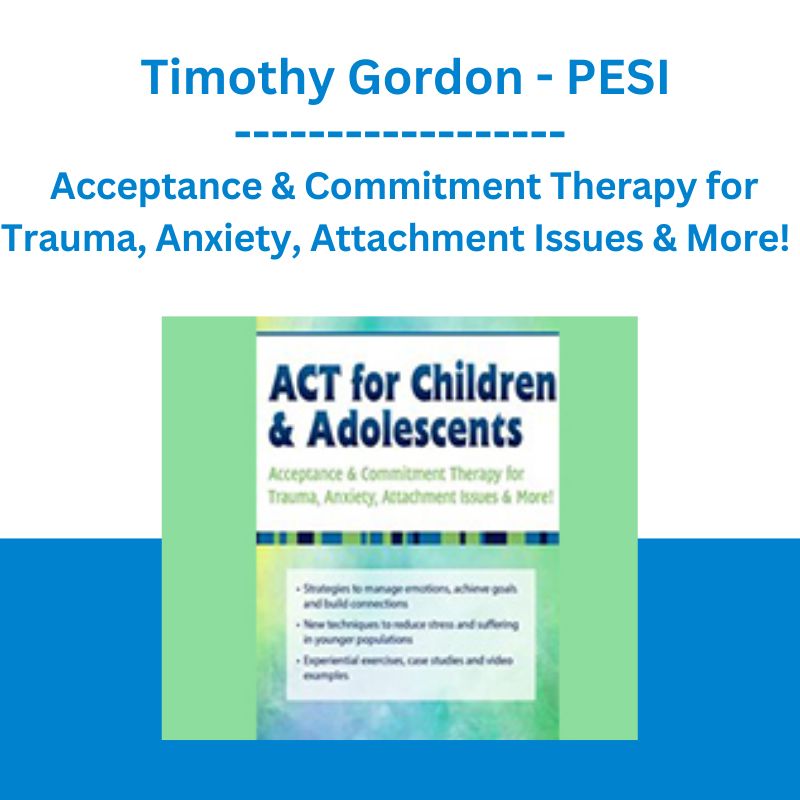*** Proof of Product ***
Exploring the Essential Features of “ACT for Children & Adolescents: Acceptance & Commitment Therapy for Trauma, Anxiety, Attachment Issues & More! – Timothy Gordon – PESI”
Description
- Strategies to manage emotions, achieve goals and build connections
- New techniques to reduce stress and suffering in younger populations
- Experiential exercises, case studies and video examples
You’ve heard that desperate cry for help from a parent or caregiver to – “fix my kid”.
Integrating Acceptance and Commitment Therapy (ACT) into your practice offers a new way for you to achieve positive therapeutic outcomes with difficult-to-treat younger clients. Get ready to use new tools that will change the “fix” agenda and embrace an approach of acceptance and build on children’s strengths.
Join experienced ACT trainer Tim Gordon, MSW, RSW, as he delivers an exercise and technique-heavy workshop that will give you the tools needed to more effectively treat kids with anger, anxiety, depression, eating disorders, trauma and family conflict.
Tim will teach you the main concepts of ACT and how to empower kids how to live a more engaged life by navigating with acceptance, self-compassion and present moment skills including mindfulness.
ACT for children and adolescents is not merely a new technique or set of methods, it’s a scientific approach enhancing practices that already work for many clinicians, breathing new life into case conceptualization and looking at our most stuck cases. Through case examples, video clips, and role-play you will be able to integrate ACT skills in your practice tomorrow!
Speaker
Timothy Gordon, MSW, RSW, is a social worker, ACT trainer, international presenter, and author.
Tim has a mission to offer evidence-based psychotherapy to help others live full and abundant lives. He specializes in working with attachment and trauma issues, including children and adolescents who have suffered abuse. He is the co-author of The ACT Approach: A Comprehensive Guide for Acceptance and Commitment Therapy (PESI, 2017) and The ACT Deck: 55 Acceptance & Commitment Therapy Practices to Build Connection, Find Focus and Reduce Stress (PESI, 2017). He has also authored a self-help book integrating ACT with attachment-based therapeutic practices into his work. He was an instructor of the Clinical Behavioral Sciences program, where he taught ACT at McMaster University in Hamilton, Ontario.
As Tim presents ACT workshops around the world, he is renowned for his passion and his experiential approach to training professionals.
Speaker Disclosures:
Financial: Timothy Gordon maintains a private practice and receives royalties as a published author. He receives a speaking honorarium, recording, and book royalties from PESI, Inc. Timothy Gordon has no relevant financial relationships with ineligible organizations.
Non-financial: Timothy Gordon is a member of the Ontario College of Social Workers & Social Service Workers and the Ontario Association of Social Workers.
Target Audience
Addiction Counselors, Case Managers, Counselors, Teachers/Educators, Marriage & Family Therapists, Nurses, Occupational Therapists & Occupational Therapy Assistants, Psychologists, Social Workers, and other Mental Health Professionals.
Outline
ACT in a Nutshell
- The role of values: mindfulness, acceptance, commitment, behavior
- Experiential avoidance
- Psychological flexibility
- ACT for children & adolescents
- The hexagon model
Role of Exposure in ACT
- Translate client values into behavioral goals
- Barriers to behavioral goals: external and internal avoidance
- External exposure
Situations
People - Internal exposure
Thoughts
Emotions
Memories
Bodily sensations - Psychological flexibility in young people
Games and activities
Assess and Track
- Assess the function of behavior in young people
- Three categories of behavior: open-aware-engaged
- Create a therapeutic contract, agenda and agreement
ACT in Action – Strategies, Games, Activities and Experiential Exercises for Children & Adolescents:
- Anxiety
- Trauma
- Attachment issues
- Body dysmorphic disorder
- Bullying
- Family conflict
Group Settings & Schools
- Use ACT in groups with children and adolescents
- ACT in schools and non-clinical settings
Objectives
- Describe the six processes that underlie psychological flexibility.
- Formulate common clinical problems in the treatment of children using a psychological flexibility model.
- Explain how the model of psychological flexibility can be organized in three major interventions that underlie most 3rd wave of cognitive behavioral therapies.
- Demonstrate the ability to formulate an ACT consistent therapeutic agreement and gain sufficient buy in from primary caregivers and other systems.
- Show how to use “creative hopelessness” to motivate a change in the control agenda including experiential activities aimed at bringing children into direct contact with letting go of their attempts to escape unwanted thoughts and feelings.
- Demonstrate at least three skills or methods to increase ‘awareness’ in child client populations and related buy-in from primary caregivers.
- Demonstrate at least three skills or methods to increase ‘engagement’ in child client populations and related buy-in from primary caregivers.
- Distinguish between goals and values as specified in ACT and how to use primary caregivers values for buy-in.
Please see the full list of alternative group-buy courses available here: https://lunacourse.com/shop/










 Team NFT Money - Ultimate NFT Playbook
Team NFT Money - Ultimate NFT Playbook  Racing Workshop - Complete Online Package
Racing Workshop - Complete Online Package